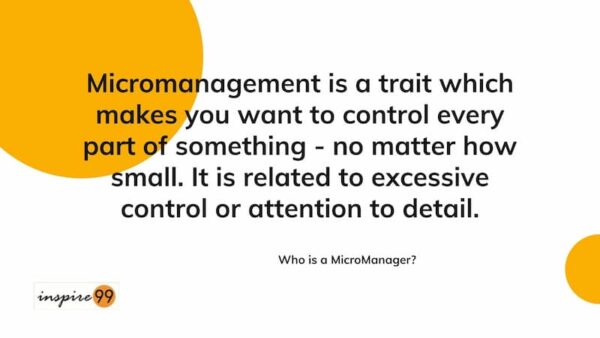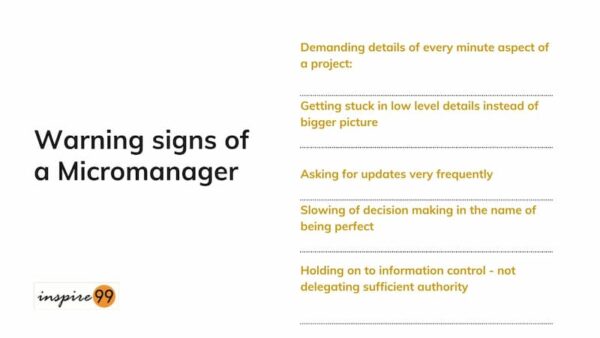Micromanager: I love talking about leadership and management. Although both are required for a company, we must be able to choose and vary between the two for effective outcomes. You should be able to manage people but also provide leadership. Sometimes these two act as contrary goals because leadership demands that you let people free and do their stuff. Management at the other hand demands control over a project. In this article, we talk about a micromanager who demands more control on a project – to the level of being detrimental and annoying to work with.
What does Micro Manage Mean?
What is the meaning of Micro Manage? You can easily split this into two parts – micro and manage. It means to manage every single aspect of a project or an outcome. Micro Manage often is about the need or feeling that we need to control all aspects of something. This might be a control or a trust issue that reduces work efficiency. If you want to control everything, invariably it adds multiple levels of supervision which not only adds time but makes the person working with you feel annoyed.

The problem with micro manage however is that it doesn’t work well with leadership and sustainability. In an organisation, you must work with other people to get things done. If you don’t trust others, then you immediately are looking at the compliments of being a bad manager. Instead of this, people will treat you as an individual performer where you can control more aspects of your work. Although I might say that the best way to get out of it is to become better – it is not easy.
5 Signs of a MicroManager
If you are a micro manager or on the verge of being one – stop and ask yourself. Is this taking you in the right direction for your career and has it been a problem before? If it has, you can start thinking about whether you want to fix that problem. Here are some things that might help you identify if you are showing traits of being a micromanager.

- Demanding details of every minute aspect of a project: Do you want to know progress at every single stage – are you filled with anxiety that if you don’t ask, things don’t get done right?
- Asking for updates very frequently: Are you asking for more than enough details? Is this getting to the verge that you are interrupting people too much and not letting them work? Maybe you find it the appropriate number, do the people who you manage also feel that?
- Getting stuck in low-level details instead of the bigger picture: This is one of the biggest problems when you don’t know how to delegate. Have you set up outcomes and left people to do it or do you keep getting involved in the details? – How to use 4 d’s of time management for prioritisation
- Slowing of decision-making in the name of being perfect: Perfection is a myth – are you bogged down by perfection as a manager? Is that at the micro levels of a project or are you ok with good enough? Perfection can sound like a compliment – do people working with you compliment you for that or are they annoyed? – 5 Reasons why being perfect is bad-Progress vs Perfection
- Holding on to information control – not delegating sufficient authority: This probably is the worst aspect of being a micromanager – are you an information hoarder? If you like this feeling of power, then you are showing signs of being a micromanager at work.
Effects of Micromanagement
Employee disengagement: People get fed up easily while working for a micromanager. They won’t be excited to take initiatives or lead projects because there’s no scope for leadership. This is usually replaced with fear and loss of faith in the initiative.
Hostility: This is an awful effect of micromanagement. In aggressive cases, it might lead to people reacting defensively and spending more time in preventing a mistake rather than focusing on innovative challenges. It wrongly associates problem solving abilities into solving petty issues of micromanagement
Mental Health Issues: Most often these unhealthy environments can create issues such as anxiety, loss of confidence, etc. This immediately impacts the working environment and you’d risk people hating the work environment. Imagine the type of outcome such a place would produce?

The effects of micromanagement are far more imposing than it appears. It may seem that a micromanaging boss is innocuous, but the impact on culture can be extreme. If you face a micro manager in your environment, please act proactively. Don’t let this impact your personal space.

Pingback: Do You Actively Practice Delegation as a Leadership Skill? - Inspire99
Pingback: 8 Time Management Skills to Increase Productivity - Inspire99